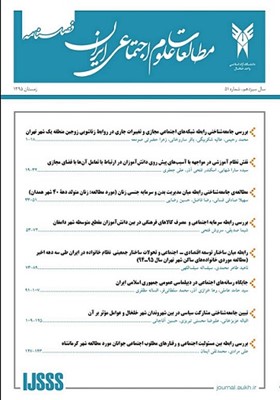بررسی رابطه مشارکت والدین با پیشرفت تحصیلی دانش آموزان پایه پنجم شهر گرگان
محورهای موضوعی : خانوادهصدرالدین ستاری 1 , مهدی میرکی زاده 2
1 - گروه علوم تربیتی، دانشگاه آزاد اسلامی واحد اردبیل
2 - دانش آموخته کارشناسی ارشد مدیریت آموزشی دانشگاه آزاد اسلامی پردیس علوم و تحقیقات واحد اردبیل
کلید واژه: پیشرفت تحصیلی, شهر گرگان, مشارکت والدین, پایه پنجم,
چکیده مقاله :
این پژوهش به منظور بررسی رابطه مشارکت والدین با پیشرفت تحصیلی دانش آموزان پایه پنجم ابتدایی شهر گرگان با روش تحقیق توصیفی از نوع همبستگی انجام گردید. جامعه آماری پژوهش را والدین دانش آموزان پسر مشغول به تحصیل در پایه پنجم ابتدایی شهر گرگان که طبق آمار اداراه آموزش و پرورش شهر گرگان 2950 نفر بود، تشکیل می داد. از این جامعه آماری تعداد 320 نفر با استفاده از جدول نمونه گیری کرجسی و مورگان و با روش نمونه گیری تصادفی خوشه ای انتخاب شد. داده های مورد نیاز برای متغیر مشارکت والدین از طریق پرسشنامه استاندارد مارگارت جمع آوری شد. معدل دانش آموزان هم به عنوان شاخص پیشرفت تحصیلی در نظر گرفته شد. روایی صوری و محتوایی پرسشنامه مشارکت والدین توسط متخصصان و اساتید مورد تایید و پایایی آن با استفاده از روش آلفای کرونباخ برابر93/. به دست آمد. دادهها با استفاده از روشهای آمار توصیفی و استنباطی(آزمون T تک گروهه، همبستگی پیرسون و رگرسیون چند متغیری) تجزیه و تحلیل گردید. نتایج به دست آمده نشان داد بین مشارکت والدین با پیشرفت تحصیلی دانش آموزان ارتباط مثبت و معناداری وجود دارد. همچنین مولفه های نظارت والدین و ارتباط آموزشی توان پیش بینی پیشرفت تحصیلی دانش آموزان را دارند ولی مولفه انتظارات والدین توان پیش بینی پیشرفت تحصیلی را ندارد.
This research was conducted to investigate the relationship between parents' participation with academic achievement of fifth grade elementary students in Gorgan city using descriptive correlation research method. The statistical population of the study consisted of parents of male students studying in the fifth elementary school of Gorgan, which was 2950 according to the statistics of the education department of Gorgan. From this statistical population, 320 people were selected by using the krejcie and Morgan sampling table and by cluster random sampling method. The data required for parents' participation variable was collected using Margaret standard questionnaire. The student's average was also considered as an indicator of academic achievement. The formal & content validity of the parents' participation questionnaire was approved by the experts, and the reliability of questionnaire by using Cronbach's alpha was obtained 0/93. The collective Data were analyzed by using descriptive and inferential statistics (single group T test, Pearson correlation and multiple regression analysis). The results show that the significant & positive relationship between parents' participation with students academic achievement. Also, Parents' Supervision and educational' relation can predict students' academic achievement, but the Parents' Expectations component cannot predict academic achievement.
_||_


